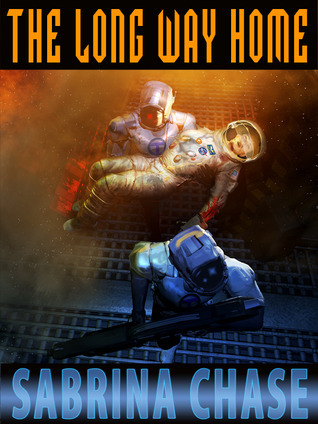Recent Reading: The Long Way Home by Sabrina Chase
So, what with one thing and another, I’ve been dipping into my TBR pile lately. I was in the mood for something science fictiony, so I opened up the first SF-looking kind of thing I came to on my Kindle. That was The Long Way Home by Sabrina Chase.

Sabrina Chase, I said to myself. That sounds familiar. What have I read by her? It turns out Sabrina Chase is the person who wrote The Last Mage Guardian, which was one of the better novels in the Noblebright fantasy bundle I got the other year. I liked that fantasy novel enough to put The Long Way Home on my Kindle after reading it, where of course it sat for a long time gathering virtual dust.
Well, if anything, this SF novel … which is really a trilogy … is at least as good as The Last Mage Guardian. Maybe better. Different, though, so not that easy to compare. This SF trilogy is more complex, slower-paced, contains almost no romance (though in the first book, there’s a little hinting about potential romance to come), and offers characters who are more subtle and more complex.
Moire Cameron is in trouble as the book opens.
There isn’t much new or different about this kind of trouble. She’s in a
battle, in space. She’s flying a little personal fighter craft of some kind. As
I say, it’s a pretty familiar situation and I was not initially very
interested. Even then, though, the reader does get hints about Moire’s complex
backstory. She joined the mercenaries to avoid someone else, some dangerous
enemy, who wants . . . something. She knows something important, but she
apparently can’t just yell her secrets to the skies and get her enemies off her
back that way because . . . reasons. She has to keep her past secret from
everyone, and she never thinks about her past in detail, so the reader has to
puzzle it out along the way.
So there Moire is, in a battle in space. She pulls
off an impressive maneuver that gets her noticed and events slowly unfold from there. Eventually
the reader meets the secondary protagonist, a naval commander named Ennis, with
a complex backstory of his own. Enemies arrive, Moire joins a mutiny to get
away, and the plotlines of the story diverge rapidly, to come back together
only near the end, and then separate again. It’s after Moire’s off the original
ship and on the run that the story picks up.
So, non-spoilery stuff you might want to know about
this book:
a) The first book is not self-contained. Just know that going in. The second and third books are available. I’m reading the second one now.
b) Moire becomes more interesting and engaging the
longer you know her. The story also becomes more interesting and engaging as
you get deeper into it.
c) We do have one mind-boggling coincidence to
bring an important secondary character into play, but it’s not that hard to
just go along with it, especially because the extremity of the coincidence is
not apparent at first.
d) The writing is solid.
I’ve been re-reading all the Beverly Connor mysteries, which are thoroughly catchy and I like them a lot, but the difference in the quality of the sentence-level writing is underlined by going from one author to the other in quick succession. Although Connor’s writing is not bad, I experience constant low-level annoyance in her books because of her use of the simple past when the past perfect would be more appropriate and her use of “may” when it should be “might.” Those sorts of problems are absent in Chase’s writing. The prose in The Long Way Home is not poetic or lyrical or evocative – no descriptors of that kind come to mind – but it’s solid, correct, and easy to read. It’s the kind of prose that doesn’t call attention to itself or get in the way, which is well suited to the story.
e) The second book is immediately engaging. This is
not unexpected because it opens almost where the first leaves off, so the
reader is already involved in the story.
f) Wow, are the bad guys bad. They are SO evil,
they might be a little bit over the top. I’m not having any trouble believing
in them, however, partly because we spend only a little time in villain pov.
Ordinarily I just detest villain pov, but these sections are so brief they
don’t get on my nerves very much. It’s a little difficult to decide whether the
occasional sections spent in the pov of minor secondary characters and / or
villains are an asset to the overall story, but on the whole I do think the
information given to the reader via those sections would be hard to dispense
with. And they are brief, thankfully, so it’s not like the reader is pulled out
of the main story for long periods.
g) The story is a little hard to place. A bit slow for space opera, particularly for the first third or so of the first book; and the fairly complicated braiding of pov is not necessarily typical for space opera. Definitely not a science fiction romance. Not military SF, though there are aspects that are like military SF. I think if this were fantasy, I’d call it epic fantasy. Since it’s SF, I’m not sure. Let’s say this is a more traditional science fiction adventure story, one that isn’t trying to push the edges of the genre but is simply aiming to tell a good story. I like it a lot, and the second book more than the first because I’m familiar with the setup.
If you’d like a good, solid, traditional adventure story, then by all means give this one a try.
Please Feel Free to Share:












